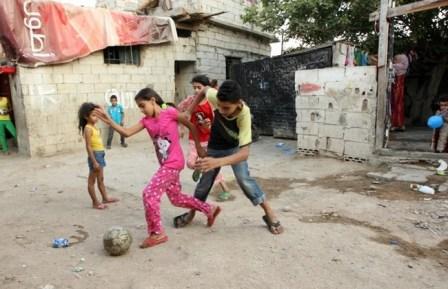
According to most recent figures, 1.5 million Lebanese live below the poverty line, of whom 470,000 are children. In November, the World Bank warned that if confidence was not restored in Lebanon's crisis-hit economy, the poverty rate could rise to as much as half the population in 2020 – putting children and young people’s education, protection and health care at further risk.
“Children are now most vulnerable, in the midst of the current economic crisis in Lebanon,” Yukie Mokuo, UNICEF Representative to Lebanon, said in a statement. “As prices rise and people lose their jobs, everyone is affected, particularly in the poorest communities.”
This week, UNICEF and its partners activated a cash assistance program to support approximately 40,000 children from 15,000 Lebanese families.
Working with the National Poverty Targeting Program, the Social Affairs Ministry, the prime minister’s office and the World Food Program, UNICEF has begun targeting the poorest Lebanese households to receive a cash grant of between LL160,000 and LL640,000 – depending on the number of children per household.
As part of the series of “painful” steps that Prime Minister Hassan Diab has said the government need to take to escape a deep financial crisis, the 2020 state budget was endorsed by Parliament last month with around $700 million in spending cuts.
“We are very concerned if there are cuts made related to children,” Sarah Hague, UNICEF’s chief of policy for Lebanon, said in the statement that was released Wednesday. “However the bigger question is to what extent people are going to rely more and more on the negative coping strategies we have already begun to see – children not going to school, marrying off younger, or being sent out to work.”
According to the Labor Ministry, there are already more than 100,000 child laborers in Lebanon, 35,000 of them Lebanese – working mainly in the industrial and agricultural sector. As a result of the economic crisis, the UNHCR has recorded a sharp uptake in the number of children being forced to work in recent months.
The new UNICEF support drive provides the money to families in the form of one-time payments made onto special “e-cards” – which they can then withdraw cash from at ATMs or use directly in shops.
Hague said that field work has indicated the money is primarily being used for the most basic of necessities like rent, food and healthcare.
However, despite there being an increase in need, UNICEF is struggling itself as a result of funding gaps.
“The challenge is that you can sell an earthquake to a donor, or a tsunami, you cannot sell a devaluation or an economic crisis,” Hague said. “We are seeing an increase in need, but we just cannot reach all of these people.”
As a result, they are only able to target the 40,000 currently registered under the National Poverty Targeting Program. This poses its own set of problems.
For one, those families who find themselves just above the cut-off receive no assistance despite living in abject poverty.
“The difference between being included and not is tiny. When you meet two families where one is under the NPTP and one is not, you see there is hardly any difference between them,” Hague said. “This means there are tens of thousands of households not receiving the necessary support.”
This cash support to Lebanese households comes on top of UNICEF’s existing programs that support the most vulnerable Lebanese, Syrian and Palestinian children and young people across the country with basic services, including education, social assistance, child protection, youth development, health and nutrition, and water and sanitation.
Source: The Daily Star
 FR
FR EN
EN AR
AR








